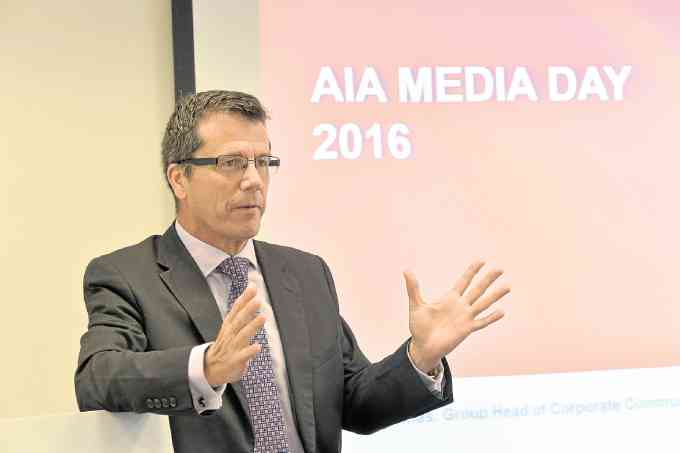Before you skip another workout session, guzzle an extra bottle of beer, or say yes to that extra slice of holiday ham, think of not just your health, but your life insurance policy as well.
Such thought might seem a bit grim for most people, given that life insurance has always been associated with, well, death.
But that’s exactly the perception that international insurance provider AIA Group Limited wants to change as it continues with its company’s innovation.
Basically, what they want is for their life insurance products to inspire people to “lead longer, happier, and healthier lives.”
“We’re changing our message from, ’you die, we pay,’ to ‘we’ll help you live a better life—but, if you die, we pay,’” said Mark Saunders, AIA group chief strategy and marketing officer, at the company’s first “Insights Day” held recently at their headquarters in Hong Kong.
AIA, the largest independent publicly listed pan-Asian life insurance group, is the parent company of Philippine American Life and General Insurance (Philam Life).
The company is present in 18 markets: China, Hong Kong, Singapore, Thailand, Malaysia, Brunei, Australia, New Zealand, Macau, Indonesia, Korea, Taiwan, Vietnam, India, Sri Lanka, Myanmar, Cambodia and the Philippines.
“We really want to focus on the customer—on their health and wellness, said Gordon Watson, AIA regional chief executive. “We believe that can take us to the next level.”
To do this, the insurance firm is encouraging clients to join their wellness program called Vitality, wherein they can earn certain rewards for achieving personal health goals.
These rewards could be something as simple as a cinema-ticket discount, or up to 20-percent off on premiums.
The program has been running since last year here in the Philippines, and is available with eligible Philam Life and BPI-Philam insurance policies. Early next year, Philam Life plans to formally launch the Philam Vitaiity Active mobile app, which will make it even easier for clients to track their progress in achieving their fitness targets.
Citing a World Health Organization (WHO) study, Saunders said there were four major killers in the world: cancer, diabetes, lung and heart disease—basically, illnesses contracted based on poor lifestyle choices.
Saunders said these four diseases account for 60 percent of deaths, and attributed to four bad habits: not eating healthy, lack of exercise, smoking and alcohol abuse.
“We all know we should eat better, exercise better, shouldn’t smoke, shouldn’t eat too much. The Vitality program is designed for you to overcome that natural human instinct of not doing what’s right for you sometimes,” said Saunders. “We like it because it’s noble, and because we don’t want people to die, or get sick and file health claims. It’s the purest form of creating shared value.”
On the agency side, AIA has also employed a number of changes when it comes to its sales approach.
Instead of getting their financial advisors to simply peddle insurance, Sim Preston, group chief operations officer, said they were retraining their staff so that they would “serve our customers with insurance products they need.”
On the consumer side, it’s also a shift from buying insurance to buying peace of mind, Preston added.
“Even though we know it’s the right thing to buy life insurance. We have presence bias. That instant gratification—life insurance is not that. Presence bias prevents us from buying life insurance now,” said Saunders.
Technology plays a big part in the recruitment—and retraining—of AIA agents, as well as how they market the company’s products.
Using their iPos (interactive point-of-sale) technology, agents now process new applications using tablets, instead of having clients fill out a number of paper forms.
Here in the Philippines, Philam Life put up a facility called Genesis by Philam Life in Makati City. It’s a space divided into three areas: The Farm, where advisors receive the necessary training; The Hive, a “modern work space for individual and group collaboration”; and The Nest, where advisors can receive clients for consultation on their financial needs.
Another Philam innovation, Spark, is a walk-in customer service facility in Taguig City, where clients can make full use of the company’s new technological platforms to transact or manage their policies.
“We’re no longer your grandfather’s Philam Life,” said Watson.
Such developments coupled with Asia’s strong economic growth spell only excitement for AIA, said group CEO Mark Tucker.
“If you think about the opportunity, the opportunity in Asia is around the retail customers, and the retail customers continue to consume,” he said, “We are in the sweet spot of the industry. This is the Asian century, there is no doubt in my mind.”
As for the Philippines, where insurance penetration rates “are very, very, very low,” Watson said it was in AIA and Philam Life’s hands to do a better job at educating Filipinos on the importance of life insurance.
“Even if they don’t buy from us, personally, I’d rather they buy from a competitor than not at all. With the agents, it’s their duty [to inform people on the benefits of life insurance]. I tell them, even if they don’t buy from you, at least you’ve done your duty,” he said.
